- Home
- Edith Wharton
Early Short Stories Vol. 2 Page 4
Early Short Stories Vol. 2 Read online
Page 4
Parvis, civilly, but without vain preamble,—in the manner of a man who has his watch in his hand,—had set forth the object of his visit. He had “run over” to England on business, and finding himself in the neighborhood of Dorchester, had not wished to leave it without paying his respects to Mrs. Boyne; without asking her, if the occasion offered, what she meant to do about Bob Elwell’s family.
The words touched the spring of some obscure dread in Mary’s bosom. Did her visitor, after all, know what Boyne had meant by his unfinished phrase? She asked for an elucidation of his question, and noticed at once that he seemed surprised at her continued ignorance of the subject. Was it possible that she really knew as little as she said?
“I know nothing—you must tell me,” she faltered out; and her visitor thereupon proceeded to unfold his story. It threw, even to her confused perceptions, and imperfectly initiated vision, a lurid glare on the whole hazy episode of the Blue Star Mine. Her husband had made his money in that brilliant speculation at the cost of “getting ahead” of some one less alert to seize the chance; the victim of his ingenuity was young Robert Elwell, who had “put him on” to the Blue Star scheme.
Parvis, at Mary’s first startled cry, had thrown her a sobering glance through his impartial glasses.
“Bob Elwell wasn’t smart enough, that’s all; if he had been, he might have turned round and served Boyne the same way. It’s the kind of thing that happens every day in business. I guess it’s what the scientists call the survival of the fittest,” said Mr. Parvis, evidently pleased with the aptness of his analogy.
Mary felt a physical shrinking from the next question she tried to frame; it was as though the words on her lips had a taste that nauseated her.
“But then—you accuse my husband of doing something dishonorable?”
Mr. Parvis surveyed the question dispassionately. “Oh, no, I don’t. I don’t even say it wasn’t straight.” He glanced up and down the long lines of books, as if one of them might have supplied him with the definition he sought. “I don’t say it WASN’T straight, and yet I don’t say it WAS straight. It was business.” After all, no definition in his category could be more comprehensive than that.
Mary sat staring at him with a look of terror. He seemed to her like the indifferent, implacable emissary of some dark, formless power.
“But Mr. Elwell’s lawyers apparently did not take your view, since I suppose the suit was withdrawn by their advice.”
“Oh, yes, they knew he hadn’t a leg to stand on, technically. It was when they advised him to withdraw the suit that he got desperate. You see, he’d borrowed most of the money he lost in the Blue Star, and he was up a tree. That’s why he shot himself when they told him he had no show.”
The horror was sweeping over Mary in great, deafening waves.
“He shot himself? He killed himself because of THAT?”
“Well, he didn’t kill himself, exactly. He dragged on two months before he died.” Parvis emitted the statement as unemotionally as a gramophone grinding out its “record.”
“You mean that he tried to kill himself, and failed? And tried again?”
“Oh, he didn’t have to try again,” said Parvis, grimly.
They sat opposite each other in silence, he swinging his eye-glass thoughtfully about his finger, she, motionless, her arms stretched along her knees in an attitude of rigid tension.
“But if you knew all this,” she began at length, hardly able to force her voice above a whisper, “how is it that when I wrote you at the time of my husband’s disappearance you said you didn’t understand his letter?”
Parvis received this without perceptible discomfiture. “Why, I didn’t understand it—strictly speaking. And it wasn’t the time to talk about it, if I had. The Elwell business was settled when the suit was withdrawn. Nothing I could have told you would have helped you to find your husband.”
Mary continued to scrutinize him. “Then why are you telling me now?”
Still Parvis did not hesitate. “Well, to begin with, I supposed you knew more than you appear to—I mean about the circumstances of Elwell’s death. And then people are talking of it now; the whole matter’s been raked up again. And I thought, if you didn’t know, you ought to.”
She remained silent, and he continued: “You see, it’s only come out lately what a bad state Elwell’s affairs were in. His wife’s a proud woman, and she fought on as long as she could, going out to work, and taking sewing at home, when she got too sick—something with the heart, I believe. But she had his bedridden mother to look after, and the children, and she broke down under it, and finally had to ask for help. That attracted attention to the case, and the papers took it up, and a subscription was started. Everybody out there liked Bob Elwell, and most of the prominent names in the place are down on the list, and people began to wonder why—”
Parvis broke off to fumble in an inner pocket. “Here,” he continued, “here’s an account of the whole thing from the ‘Sentinel’—a little sensational, of course. But I guess you’d better look it over.”
He held out a newspaper to Mary, who unfolded it slowly, remembering, as she did so, the evening when, in that same room, the perusal of a clipping from the “Sentinel” had first shaken the depths of her security.
As she opened the paper, her eyes, shrinking from the glaring head-lines, “Widow of Boyne’s Victim Forced to Appeal for Aid,” ran down the column of text to two portraits inserted in it. The first was her husband’s, taken from a photograph made the year they had come to England. It was the picture of him that she liked best, the one that stood on the writing-table upstairs in her bedroom. As the eyes in the photograph met hers, she felt it would be impossible to read what was said of him, and closed her lids with the sharpness of the pain.
“I thought if you felt disposed to put your name down—” she heard Parvis continue.
She opened her eyes with an effort, and they fell on the other portrait. It was that of a youngish man, slightly built, in rough clothes, with features somewhat blurred by the shadow of a projecting hat-brim. Where had she seen that outline before? She stared at it confusedly, her heart hammering in her throat and ears. Then she gave a cry.
“This is the man—the man who came for my husband!”
She heard Parvis start to his feet, and was dimly aware that she had slipped backward into the corner of the sofa, and that he was bending above her in alarm. With an intense effort she straightened herself, and reached out for the paper, which she had dropped.
“It’s the man! I should know him anywhere!” she cried in a voice that sounded in her own ears like a scream.
Parvis’s voice seemed to come to her from far off, down endless, fog-muffled windings.
“Mrs. Boyne, you’re not very well. Shall I call somebody? Shall I get a glass of water?”
“No, no, no!” She threw herself toward him, her hand frantically clenching the newspaper. “I tell you, it’s the man! I KNOW him! He spoke to me in the garden!”
Parvis took the journal from her, directing his glasses to the portrait. “It can’t be, Mrs. Boyne. It’s Robert Elwell.”
“Robert Elwell?” Her white stare seemed to travel into space. “Then it was Robert Elwell who came for him.”
“Came for Boyne? The day he went away?” Parvis’s voice dropped as hers rose. He bent over, laying a fraternal hand on her, as if to coax her gently back into her seat. “Why, Elwell was dead! Don’t you remember?”
Mary sat with her eyes fixed on the picture, unconscious of what he was saying.
“Don’t you remember Boyne’s unfinished letter to me—the one you found on his desk that day? It was written just after he’d heard of Elwell’s death.” She noticed an odd shake in Parvis’s unemotional voice. “Surely you remember that!” he urged her.
Yes, she remembered: that was the profoundest horror of it. Elwell had died the day before her husband’s disappearance; and this was Elwell’s portrait; and it was the portrait of the ma
n who had spoken to her in the garden. She lifted her head and looked slowly about the library. The library could have borne witness that it was also the portrait of the man who had come in that day to call Boyne from his unfinished letter. Through the misty surgings of her brain she heard the faint boom of half-forgotten words—words spoken by Alida Stair on the lawn at Pangbourne before Boyne and his wife had ever seen the house at Lyng, or had imagined that they might one day live there.
“This was the man who spoke to me,” she repeated.
She looked again at Parvis. He was trying to conceal his disturbance under what he imagined to be an expression of indulgent commiseration; but the edges of his lips were blue. “He thinks me mad; but I’m not mad,” she reflected; and suddenly there flashed upon her a way of justifying her strange affirmation.
She sat quiet, controlling the quiver of her lips, and waiting till she could trust her voice to keep its habitual level; then she said, looking straight at Parvis: “Will you answer me one question, please? When was it that Robert Elwell tried to kill himself?”
“When—when?” Parvis stammered.
“Yes; the date. Please try to remember.”
She saw that he was growing still more afraid of her. “I have a reason,” she insisted gently.
“Yes, yes. Only I can’t remember. About two months before, I should say.”
“I want the date,” she repeated.
Parvis picked up the newspaper. “We might see here,” he said, still humoring her. He ran his eyes down the page. “Here it is. Last October—the—”
She caught the words from him. “The 20th, wasn’t it?” With a sharp look at her, he verified. “Yes, the 20th. Then you DID know?”
“I know now.” Her white stare continued to travel past him. “Sunday, the 20th—that was the day he came first.”
Parvis’s voice was almost inaudible. “Came HERE first?”
“Yes.”
“You saw him twice, then?”
“Yes, twice.” She breathed it at him with dilated eyes. “He came first on the 20th of October. I remember the date because it was the day we went up Meldon Steep for the first time.” She felt a faint gasp of inward laughter at the thought that but for that she might have forgotten.
Parvis continued to scrutinize her, as if trying to intercept her gaze.
“We saw him from the roof,” she went on. “He came down the lime-avenue toward the house. He was dressed just as he is in that picture. My husband saw him first. He was frightened, and ran down ahead of me; but there was no one there. He had vanished.”
“Elwell had vanished?” Parvis faltered.
“Yes.” Their two whispers seemed to grope for each other. “I couldn’t think what had happened. I see now. He TRIED to come then; but he wasn’t dead enough—he couldn’t reach us. He had to wait for two months; and then he came back again—and Ned went with him.”
She nodded at Parvis with the look of triumph of a child who has successfully worked out a difficult puzzle. But suddenly she lifted her hands with a desperate gesture, pressing them to her bursting temples.
“Oh, my God! I sent him to Ned—I told him where to go! I sent him to this room!” she screamed out.
She felt the walls of the room rush toward her, like inward falling ruins; and she heard Parvis, a long way off, as if through the ruins, crying to her, and struggling to get at her. But she was numb to his touch, she did not know what he was saying. Through the tumult she heard but one clear note, the voice of Alida Stair, speaking on the lawn at Pangbourne.
“You won’t know till afterward,” it said. “You won’t know till long, long afterward.”
The End of Afterward
THE FULNESS OF LIFE
December 1893
I.
For hours she had lain in a kind of gentle torpor, not unlike that sweet lassitude which masters one in the hush of a midsummer noon, when the heat seems to have silenced the very birds and insects, and, lying sunk in the tasselled meadow-grasses, one looks up through a level roofing of maple-leaves at the vast shadowless, and unsuggestive blue. Now and then, at ever-lengthening intervals, a flash of pain darted through her, like the ripple of sheet-lightning across such a midsummer sky; but it was too transitory to shake her stupor, that calm, delicious, bottomless stupor into which she felt herself sinking more and more deeply, without a disturbing impulse of resistance, an effort of reattachment to the vanishing edges of consciousness.
The resistance, the effort, had known their hour of violence; but now they were at an end. Through her mind, long harried by grotesque visions, fragmentary images of the life that she was leaving, tormenting lines of verse, obstinate presentments of pictures once beheld, indistinct impressions of rivers, towers, and cupolas, gathered in the length of journeys half forgotten—through her mind there now only moved a few primal sensations of colorless well-being; a vague satisfaction in the thought that she had swallowed her noxious last draught of medicine… and that she should never again hear the creaking of her husband’s boots—those horrible boots—and that no one would come to bother her about the next day’s dinner… or the butcher’s book….
At last even these dim sensations spent themselves in the thickening obscurity which enveloped her; a dusk now filled with pale geometric roses, circling softly, interminably before her, now darkened to a uniform blue-blackness, the hue of a summer night without stars. And into this darkness she felt herself sinking, sinking, with the gentle sense of security of one upheld from beneath. Like a tepid tide it rose around her, gliding ever higher and higher, folding in its velvety embrace her relaxed and tired body, now submerging her breast and shoulders, now creeping gradually, with soft inexorableness, over her throat to her chin, to her ears, to her mouth…. Ah, now it was rising too high; the impulse to struggle was renewed;… her mouth was full;… she was choking…. Help!
“It is all over,” said the nurse, drawing down the eyelids with official composure.
The clock struck three. They remembered it afterward. Someone opened the window and let in a blast of that strange, neutral air which walks the earth between darkness and dawn; someone else led the husband into another room. He walked vaguely, like a blind man, on his creaking boots.
II.
She stood, as it seemed, on a threshold, yet no tangible gateway was in front of her. Only a wide vista of light, mild yet penetrating as the gathered glimmer of innumerable stars, expanded gradually before her eyes, in blissful contrast to the cavernous darkness from which she had of late emerged.
She stepped forward, not frightened, but hesitating, and as her eyes began to grow more familiar with the melting depths of light about her, she distinguished the outlines of a landscape, at first swimming in the opaline uncertainty of Shelley’s vaporous creations, then gradually resolved into distincter shape—the vast unrolling of a sunlit plain, aerial forms of mountains, and presently the silver crescent of a river in the valley, and a blue stencilling of trees along its curve—something suggestive in its ineffable hue of an azure background of Leonardo’s, strange, enchanting, mysterious, leading on the eye and the imagination into regions of fabulous delight. As she gazed, her heart beat with a soft and rapturous surprise; so exquisite a promise she read in the summons of that hyaline distance.
“And so death is not the end after all,” in sheer gladness she heard herself exclaiming aloud. “I always knew that it couldn’t be. I believed in Darwin, of course. I do still; but then Darwin himself said that he wasn’t sure about the soul—at least, I think he did—and Wallace was a spiritualist; and then there was St. George Mivart—”
Her gaze lost itself in the ethereal remoteness of the mountains.
“How beautiful! How satisfying!” she murmured. “Perhaps now I shall really know what it is to live.”
As she spoke she felt a sudden thickening of her heart-beats, and looking up she was aware that before her stood the Spirit of Life.
“Have you never really known what it is to live?�
�� the Spirit of Life asked her.
“I have never known,” she replied, “that fulness of life which we all feel ourselves capable of knowing; though my life has not been without scattered hints of it, like the scent of earth which comes to one sometimes far out at sea.”
“And what do you call the fulness of life?” the Spirit asked again.
“Oh, I can’t tell you, if you don’t know,” she said, almost reproachfully. “Many words are supposed to define it—love and sympathy are those in commonest use, but I am not even sure that they are the right ones, and so few people really know what they mean.”
“You were married,” said the Spirit, “yet you did not find the fulness of life in your marriage?”
“Oh, dear, no,” she replied, with an indulgent scorn, “my marriage was a very incomplete affair.”
“And yet you were fond of your husband?”
“You have hit upon the exact word; I was fond of him, yes, just as I was fond of my grandmother, and the house that I was born in, and my old nurse. Oh, I was fond of him, and we were counted a very happy couple. But I have sometimes thought that a woman’s nature is like a great house full of rooms: there is the hall, through which everyone passes in going in and out; the drawing-room, where one receives formal visits; the sitting-room, where the members of the family come and go as they list; but beyond that, far beyond, are other rooms, the handles of whose doors perhaps are never turned; no one knows the way to them, no one knows whither they lead; and in the innermost room, the holy of holies, the soul sits alone and waits for a footstep that never comes.”
“And your husband,” asked the Spirit, after a pause, “never got beyond the family sitting-room?”
“Never,” she returned, impatiently; “and the worst of it was that he was quite content to remain there. He thought it perfectly beautiful, and sometimes, when he was admiring its commonplace furniture, insignificant as the chairs and tables of a hotel parlor, I felt like crying out to him: ‘Fool, will you never guess that close at hand are rooms full of treasures and wonders, such as the eye of man hath not seen, rooms that no step has crossed, but that might be yours to live in, could you but find the handle of the door?’”

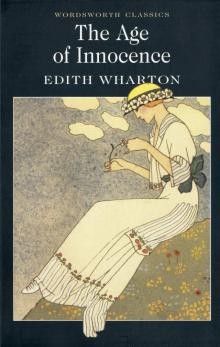 The Age of Innocence
The Age of Innocence The Reef
The Reef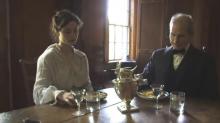 Summer
Summer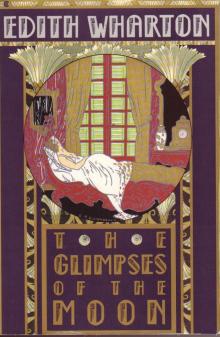 The Glimpses of the Moon
The Glimpses of the Moon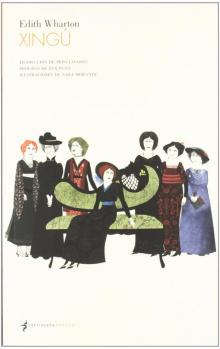 Xingu
Xingu The Fruit of the Tree
The Fruit of the Tree Fast and Loose
Fast and Loose Artemis to Actaeon and Other Verse
Artemis to Actaeon and Other Verse The Line of Least Resistance
The Line of Least Resistance The Lamp of Psyche
The Lamp of Psyche The Reckoning
The Reckoning Afterward
Afterward The New York Stories of Edith Wharton
The New York Stories of Edith Wharton The 2014 Halloween Horrors Megapack
The 2014 Halloween Horrors Megapack 'Copy': A Dialogue
'Copy': A Dialogue The Recovery
The Recovery The Fulness of Life
The Fulness of Life Early Short Stories Vol. 1
Early Short Stories Vol. 1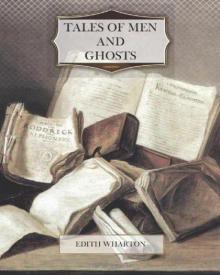 Tales of Men and Ghosts
Tales of Men and Ghosts The House of the Dead Hand
The House of the Dead Hand That Good May Come
That Good May Come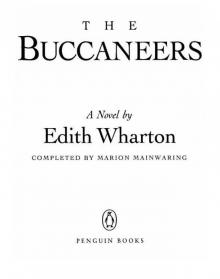 The Buccaneers
The Buccaneers Other Times, Other Manners
Other Times, Other Manners The Hermit and the Wild Woman
The Hermit and the Wild Woman Kerfol
Kerfol The Duchess at Prayer
The Duchess at Prayer Bunner Sisters
Bunner Sisters The Choice
The Choice Madame De Treymes
Madame De Treymes Ethan Frome, Summer, Bunner Sisters
Ethan Frome, Summer, Bunner Sisters In Morocco
In Morocco The Valley of Decision
The Valley of Decision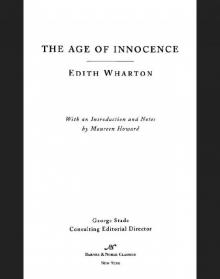 Age of Innocence (Barnes & Noble Classics Series)
Age of Innocence (Barnes & Noble Classics Series) The Angel at the Grave
The Angel at the Grave April Showers
April Showers Sanctuary
Sanctuary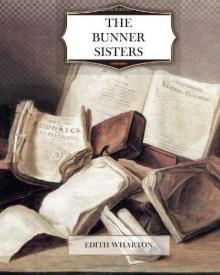 The Bunner Sisters
The Bunner Sisters Mrs. Manstey's View
Mrs. Manstey's View Writing a War Story
Writing a War Story The Custom of the Country
The Custom of the Country In Trust
In Trust The Triumph of the Night
The Triumph of the Night The Hermit and the Wild Woman, and Other Stories
The Hermit and the Wild Woman, and Other Stories Roman Fever and Other Stories
Roman Fever and Other Stories The Mission of Jane
The Mission of Jane The Descent of Man and Other Stories
The Descent of Man and Other Stories Coming Home
Coming Home The Touchstone
The Touchstone Early Short Stories Vol. 2
Early Short Stories Vol. 2 Edith Wharton's Verse, 1879-1919, from various journals.
Edith Wharton's Verse, 1879-1919, from various journals.